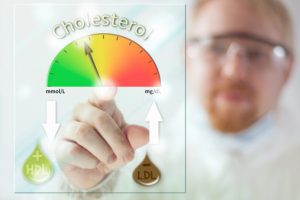
Cholesterol is naturally occurring in our bodies and can also be ingested through the foods we eat. A proper balance between HDL and LDL cholesterol is essential for good health.
If cholesterol levels are not well managed, complications can arise, particularly, an increased risk of heart disease, heart attack, or stroke. Here we will outline the signs, symptoms, and complication of high and low cholesterol.
Signs, symptoms, and risk factors for high cholesterol
Unfortunately, there aren’t any obvious signs and symptoms indicative of high cholesterol. Similarly to high blood pressure, it can be referred to as the silent killer. For this reason, signs and symptoms pointing to the existing problem of high cholesterol can be as severe as heart attack and stroke, or be less obvious like angina or pain during walking. These symptoms point to an already established problem stemming from high cholesterol.
Risk factors for high cholesterol include having a relative or family member with high cholesterol, having a family member who has experienced a heart attack or stroke, being type 2 diabetic, eating a diet high in animal fats and saturated fat, being physically inactive, having fatty deposits on the eyelids or around the eye, being of older age, being of South Asian descent, having family history of heart disease, being a smoker, and being overweight or obese.
Symptoms and risk factors of low cholesterol
Similar to high cholesterol, symptoms of low cholesterol may not be present until the development of a heart attack or stroke. You may experience severe chest pains if there is a serious blockage in a coronary artery. Chest pains in case of low cholesterol may also signify a buildup of fatty substances in an artery.
Depression and anxiety may be a result of low cholesterol, so you may experience hopelessness, nervousness, confusion, agitation, difficulty making a decision, along with changes in mood, sleep, or eating habits.
Risk factors of low cholesterol include family history, statin medication or other blood pressure treatments, and untreated clinical depression.
Complications of high and low cholesterol levels
As mentioned, if cholesterol levels are not well balanced – meaning, if HDL cholesterol is not higher than LDL level – health complications may arise. Complications related to high and low cholesterol levels include:
- Chest pains
- Heart attack
- Stroke
- Atherosclerosis
- Increased risk of suicide and violent behavior
- Low birth weight and premature delivery
- Intracerebral hemorrhage
Checking your cholesterol levels regularly, especially if you belong to one of the risk groups, is essential for your health. Your doctor can run blood tests to determine your cholesterol levels. Depending on your readings, you will be instructed on your next course of treatment, such as appropriate lifestyle changes or a statin prescription.